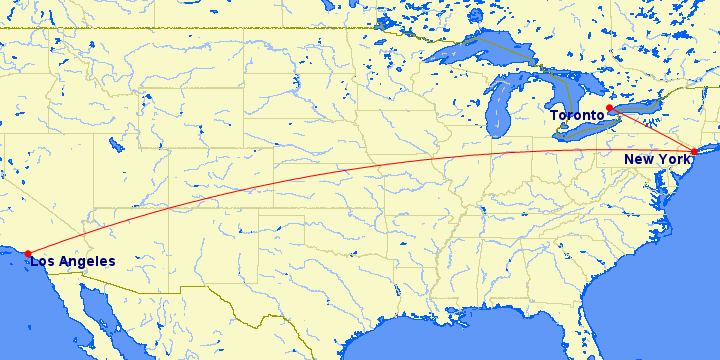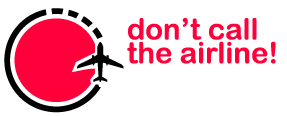Delta SkyMiles Encourages Hidden-City Ticketing (and that’s crap)
Unlike every major frequent flyer program, Delta stopped publishing an award chart, moving towards “dynamic pricing” for award flights. In practice, the system continues to follow some sort of award chart, predictably charging the same number of miles for saver award seats.
However, I’ve discovered a new trend when searching for award travel using Delta miles that is patently unfair to consumers and encourages hidden-city ticketing.
What is Hidden-City Ticketing?
Hidden-city ticketing, also known as “throwaway tickets,” is the act of booking connecting flights with the intent of ending your trip at an intermediary point in order to bypass fare rules/discount the ticket.
For example, let’s pretend you wanted to get from Los Angeles to New York City. If you searched for the ticket, it may cost $300. However, the exact same flight, with New York City as a connecting point and Toronto as your destination, may only cost $200. Airlines price tickets based on origin and destination, so even though your flight to New York City is the same had you booked it directly or as a connection to Toronto, one will price differently than the other.

In this case, you might be better off buying your ticket to Toronto, but leave the airport in New York City and abandon the connecting flight to Toronto. By doing so, you’ll save $100 in fare difference.
There are risks with hidden-city tickets:
- As a practice that’s against almost all airline tariffs, it’s theoretically possible that the airline issues a caution or penalty. In reality, unless you’re flying on a hidden-city ticket monthly, the airline will not notice or care.
- Since standard airline practice is to cancel the remaining flights in a booking if a flight is missed, it’s best to do hidden-city ticketing as one-way tickets. That way, when you miss your flight to Toronto, your return flight to Los Angeles isn’t also cancelled.
- You can’t usually check bags on a hidden-city ticket (though it’s possible, but certainly a hassle).
- If there are irregular operations, like weather or flight delay, the airline is only obligated to reroute you to your booked final destination, not your intermediary stopping point. Say your flight from Los Angeles to New York City is cancelled, the airline may just reroute you on a direct flight to Toronto.
Airlines are not fans of hidden-city ticketing, since it bypasses fare rules and costs them revenue. United Airlines famously sued an online company that simplified the booking of hidden-city tickets.
What’s Going on With Delta?
Throwaway ticketing is a common practice with revenue tickets, but not with award tickets. And the reason why is simple – award tickets are normally priced in miles based on zones (ex. from North America to Europe), so booking a hidden-city ticket wouldn’t save you money, since traditional origin-destination fare pricing doesn’t apply.
Leave it to Delta to change things though, and give a big middle finger to customers. I’ve started to notice when using the Delta SkyMiles award search engine, the system is applying origin-destination type pricing for miles. Let me explain.
Say my intention is to go from Montreal to Atlanta. For the 6:25PM departure, Delta wants 47,000 miles:

However, if I search for a trip from Montreal to Orlando on the same day, I get this:

What do you notice? I can book Montreal to Atlanta for 47,000 miles, or Montreal to Orlando via Atlanta, on the exact same outbound flight, for only 9,000 miles! That’s crazy!
In this case, I’m incentivized to book the ticket to Orlando, and just leave the airport in Atlanta. Delta is encouraging hidden-city ticketing for award travel. And that’s crap.
As I said previously, hidden-city ticketing has risks. If my flight to Atlanta is cancelled, they may reroute me on a direct to Orlando, which is not what I want. Further, it needlessly ties up seats on the undesired flight, so Delta loses revenue. This is a lose-lose situation.
I understand that Delta has moved their award pricing model to reflect revenue fares, however, if there’s saver award availability on Montreal to Orlando via Atlanta, there sure as hell should be from Montreal to Atlanta. This new pricing structure is unfair to consumers, encourages loyal flyers to engage in hidden-city ticketing, and needlessly hurts Delta’s bottom line.



Yup, it’s maddening. I use this relatively often to visit family in ATL. Booking to MCO or CLT(via ATL) almost always results in far lower dollar and mileage pricing. Like 1/4 to 1/2. Getting back can be obtuse but, as you said, it’s almost encouraged by DAL’s wonky pricing.
can’t you book the trip to Orlando, and then call within 24 hours to drop the second leg?
Nope – they reprice the whole ticket to the direct cost.
really… because usually with award tickets one can drop a leg without a change in price. Delta really is the worst then.
Southwest does the same thing
Good, I hope Delta loses millions from this.
This article is short sighted in the delivery of its judgment. The change from segment based award pricing to to origin-destination award pricing is a pro consumer move. It enables the award redemption rates to reflect the competitive environment of the published fare world. In the example above most travelers are going to be thrilled that they can go from YUL to MCO for less. If you’re in ATL or trying to get to ATL, then you’re less excited, but it is consistent with what you would be buying off the shelf and that is fair, more consistent, and better for interpreting the market place for future purchases.
Years ago a colleague bought a ticket with a hidden city destination and got off in New York, which was to be a transfer point. Delta charged his credit card for the remainder of the repriced ticket. He fought with them for months, don’t know the outcome.
Most hub and spoke carriers use this strategy, but you’re right, this is rather new with award travel. However, all my travel with DL involves a transfer at ATL (only direct destination from my home) but I still find award tickets outrageously expensive.
It’s not just Delta. I’ve experienced something similar on American.
Smiles, the brazilian ffp related to Gol do the exactly same thing.